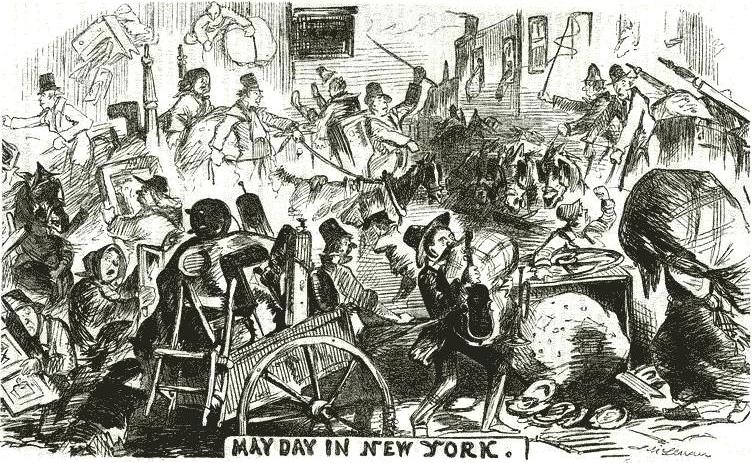02:15, Friday, September 28, 2012
01:44, Thursday, September 27, 2012
Those damn lazy furriners

Old friend of mine recently wrote:
I was chatting with someone who had recently spent a fair amount of time in Italy. She said, I'm not surprised they're having economic problems. They seem to hardly work at all.I must say this made me see red, and I responded in what was probably a rather testy tone. This smug American cliche that furriners don't work hard enough always makes me want to kick the speaker in the teeth.
Furriners work plenty hard. They just don't have the hagridden ratlike darting manner of Americans, who always have to show you how busy they are.
Stuff gets done in Italy, and well done. Italian hotels are a lot nicer than American ones, and Italian food is a lot better. Somebody has to cook it. Italian public transportation is at least as good as American, and the intercity trains are a lot better. The schools are infinitely better. The roads are as good as ours, or better, and somebody has to maintain them. There's electricity in the outlets. Trash is collected and streets are swept, both a lot better than in New York. (Except in Ravenna, which was kind of a shithole the last time I was there. That was a while ago, though.)
Italian workers certainly aren't under the harrow -- yet -- the way Amurrican workers are, though the German bankers are doing their best to put them there. But what needs doing gets done, and done well. We'd be better off imitating Italy all round than Italy would be imitating us.
The problem is that Amurricans here in God's own country have to work too hard, and we don't get shit for it, and we've convinced ourselves that being exploited and slave-driven and terrorized into frantic activity in the workplace shows how virtuous we are. Sheer madness.
22:35, Wednesday, September 26, 2012
Un entrepreneur? Moi?!

So now that I'm unemployed -- and loving every minute of it, I might add -- I get letters from the New York State Department of Labor. Here's the latest:
This is to inform you that you are eligible to apply for a program entitled Taking Care Of Business: The Self-Employment Assistance Program....Can't make this shit up, eh? Made me laugh and laugh, in a snide, mean-spirited way. The bureaucratization of entrepreneurship: only in Amurrica.If you wish to participate, you must first attend a regional workshop to learn the risks and responsibilities associated with starting a new business. You will then be informed of the extensive program requirements.
YOU CANNOT START YOUR BUSINESS UNTIL YOU HAVE ATTENDED THE WORKSHOP AND BEEN OFFICIALLY ACCEPTED INTO THE PROGRAM.
... The program requires that you take a minimum of 20 hours of entrepreneurial training (which you find on your own), and meet at least twice a week with an approved business counselor....
Once accepted into the program, you are not entitled to any extra or extended benefits, including benefits under the current Temporary Emergency Unemployment Compensation Law(*).
More to the point, who on earth would go for this deal? Joe The Plumber(tm)? You give up your extended payments, you have to attend a 'workshop' -- which the fine print tells you 'may not be close to where you live' -- and somehow 'find' twenty hours of entrepreneurship training, whatever that might be. There is not a word in this document about any actual benefit you might get from participating.
It's perfect, really: All cost, but think of the opportunity! What a country!
----------
(*) Minatory caps, italics, and boldface faithfully reproduced from the original.
23:44, Friday, September 21, 2012
The law of rule
An acquaintance was prating to me the other day about 'the rule of law' -- he may have even quoted that old bromide, 'a government of laws, not men'. What a curious infatuation. In the first place, it's impossible; in the second, undesirable.
To take the obvious and undeniable point first: laws are enforced and interpreted by men (lato sensu; including women nowadays). The law means what the cops and the DA and the contemptible Supreme Court say it means. There is no appeal to what Humbert Humbert calls the 'wingèd gentlemen of the jury'. The contorted bizarrerie of court rulings needs no belaboring for anybody who's paying attention; and this applies to benign and constructive rulings as much as to reactionary ones. Roe v Wade was as arbitrary and policy-driven as Citizens United.
Who, after all, made the laws? Not all of us got our laws from the Almighty Himself, on Sinai, and we can only envy those who did. The rest of have laws with a far less distinguished provenance -- a series of, well, men, for the most part; starting in the dark backward and abysm of time with the common law, and thence forward, through dubious characters like the Founding Fathers and Napoleon and oh, I don't know, pick your villain; Woodrow Wilson?
So there is no alternative to a government of men (and women of course). But really, even if there were, who would want it? Bad rulers can always be deposed or decapitated, like Louis XVI or Charles I. But if laws as such ever somehow per impossibile got into the saddle, how could you touch them?
It's really kind of a bizarre notion, isn't it?
There's a sensible interpretation, of course, for what is on the surface a nonsensical phrase: 'rule of law' really means something like 'orderliness' or 'procedurality'. That is to say, though we obey the law, we retain our human autonomy -- in the last analysis, law is our servant, not our master. We can change it if it no longer suits our human purposes. But then what are we to say when we can't -- when orderliness and procedurality make the obviously necessary outcome impossible? This is, of course, precisely the predicament many of us find ourselves in right now.
And yet one knows so many people who eagerly embrace these chains; who acclaim the 'rule of law' at the very moment when the rule of law threatens them, in principle at least, with rendition -- though few are worth rendering, even in the culinary sense; so the threat is more theoretical than real.
The ingenious caveat is to claim that the duly elected, nominated, and confirmed President, Congress, and Court, and all the other po-faced soup-hounds of legality, are somehow acting illegally: that there's some court somewhere even more supreme than the Supremes, and by its winged standards the actual agents of law are to be called to account.
Well, to borrow a phrase from Andrew Jackson, let the winged gentlemen enforce it. Much as I would like to see that happen, I am not holding my breath. If this transcendent law is going to be enforced, some non-winged gentlemen and ladies will have to enforce it -- must destroy the law in order to save it.
17:01, Thursday, September 20, 2012
Logic, schmogic

We're taught to evaluate an argument based on its internal logic. I'm starting to think this is a mistake. We should also consider where it leaves us, and whether we want to be there. If we end up in a place where we don't want to be, we should start looking for a counter-argument, or a flaw in the original argument. If we can't find either, then in extremis we ought to discard the original argument: assume a can opener!
This by way of further rumination on the familiar lesser-evil argument. The impeccable soundness of its logic was vindicated in an earlier post here. But where does it leave us? Helpless, passive, able only to sign off, year after year, on an increasingly evil lesser evil, and try to persuade ourselves that we feel good about it. It's hard to believe that we received the divine gift of reason solely in order to forge our own chains.
My daughter and I went to see The Master yesterday. It's long and slow but worth it. One of the things that struck me was The Master's insistence that people are different from animals, or ought to be. I was thinking that maybe we might have something to learn from the animals.
You'll never se a squirrel trapped by a syllogism. He might be cornered by a dog, or swept up for breakfast by a hawk, but he won't have talked himself into his predicament.
22:19, Wednesday, September 19, 2012
The microscopic eye

My Obiebot friends are good algebraists. They can understand equations. For example:
(10,000 / 10,000) * (1,000/1,000) * (100/100) * (10/10) ... * (0.0001/0.00001) = 10
See? Obama is ten times better than Romney!
For those whose eyes -- like mine -- tend to glaze over at sight of an equation, no matter how trivial, let me rephrase this a different way.
Lesser-evil reasoning consists essentially in discounting all the ways in which the candidates are indistinguishable, and focusing on whatever apparent or real differences there are. So the fact that (for example) they're both mass murderers, actual or aspiring, cancels out; it appears in both the numerator and denominator. Well, onto the next thing. They're both big advocates of the police state, and education 'reform', and Israel, and immiseration -- cancels out. But aha! One of them has kinder words for the uterus than the other! Well then, there's your 0.0001/0.00001 ! A tenfold difference! And since there are no other differences, well, there's your decision made for you. Register and vote, contribute and post enthusiastic dribble on your Facebook page. It's simple algebra.
As logic goes, this is flawless. It only becomes absurd at a certain level of scale. If Ted Bundy were the Demolican candidate, and John Wayne Gacy the Republicrat... Well, a Gacy administration would certainly be better for women. But at that point, most people would throw up their hands and say 'who gives a shit?'
Please note however that even in the Gacy/Bundy case, the lesser-evil logic is still ironclad and irrefutable. There's always a lesser evil, and with instruments of sufficient refinement, capable of measuring out to enough decimal places, you can always find it.
So the interesting question for me is this: at what point in the process do people stop doing nano-arithmetic? How many decimal places is too many?
I am of course quite encouraged by the fact that for a substantial number of Americans, this point was reached a long time ago. I wonder why so few of my friends are among their number, however.
23:14, Tuesday, September 18, 2012
I close the iron door

I know it's not Lent, but I have hereby officially sworn off Facebook until after the 'election'. I mean, really, how much can usefully or entertainingly be said about the idiocy of Mitt Romboma?
The 47% comment seems to have 75% of my friends orgasmic with facile glee: See! We told you he was a plutocratic fool!
Well sure, of course he is, and two plus two equals four. It's like watching Mad Max 2 and having your neighbor elbow your ribs every thirty seconds: I told you that Humongous was a bad guy! I told you!
The joy in Humongous' oafish badness derives in great part from the fact that it takes the heat off the current Murderer-In-Chief, and makes him look relatively sensible, simply because he knows how to keep his mouth shut except to utter some soothing, meaningless, scripted bromide.
It's a sitcom: Obie is Mary Tyler Moore and Willard is Ted Baxter. Though of course Mary never had regular Tuesday assassination meetings, as far as I know.
16:32, Monday, September 17, 2012
Apotheosis of the state

The state is the actuality of the ethical Idea. It is ethical mind qua the substantial will manifest and revealed to itself, knowing and thinking itself, accomplishing what it knows and in so far as it knows it. The state exists immediately in custom, mediately in individual self-consciousness, knowledge, and activity, while self-consciousness in virtue of its sentiment towards the state, finds in the state, as its essence and the end-product of its activity, its substantive freedom.I suspect that few of my liberal friends would be willing to sign off explicitly on this formulation. Yet I think that many of us act unconsciously on this basis.The state is absolutely rational inasmuch as it is the actuality of the substantial will which it possesses in the particular self-consciousness once that consciousness has been raised to consciousness of its universality. This substantial unity is an absolute unmoved end in itself, in which freedom comes into its supreme right. On the other hand this final end has supreme right against the individual, whose supreme duty is to be a member of the state.
--Hegel
This notion has been simmering in my head for a long time. What brought it to a boil was a recent email exchange on one of my lists about pedophile priests in the Catholic church -- of all things.
Everybody nowadays deplores pedophilia, of course, and quite right too -- though Socrates might have had a slightly different take on the topic. But the hell with him; I have even less use for Socrates than people generally have for pedophilia.
What strikes me about the secular liberal's response -- and even the secular lefty's response -- to buggery in the rectory is that everybody seems to agree that the big scandal is that the bishops didn't call the cops. Not that the bishops didn't get the guy away from kids; not that they didn't drum him out of the priesthood; but that they didn't call the cops.
Now one of the amiable things about the Catholic Church, I have always thought, is its wonderfully mediaeval sense of standing outside the State, and maybe even above it. A certain skepticism about the State seems well-justified, to me.
Curiously, the Church's view of the State as a ramshackle, derivative, provisional, purely instrumental affair rather coincides with the Marxist/Leninist view, to the extent that I understand the latter. MLs certainly want to take the State over and use it for their own purposes; but they also see themselves as standing outside it and over against it.
The State has its uses -- I have called the cops myself, a few times, though the only time I was at all impressed by their response was the time they arrested me. But okay: purely as an instrument, the State may occasionally serve a constructive purpose. I grant the point. Theoretically.
But it seems sad to me that so many of my friends -- who were great skeptics about the State when we were young, and subject to the draft -- have fallen back into vulgar Hegelianism; to the point where calling the cops, more or less metaphorically, is more or less the answer to everything.
(Lemma: electoral politics is of course a special case of calling the cops -- to wit, calling the good cops, and hoping, hoping that they turn up instead of the bad cops.)
One of the interesting results of this mentality is that most liberals, as far as I can tell, strongly approve of all the laws we have now which turn certain classes of wage-laborers into ex officio police informants -- schoolteachers, for example, who are required, under severe penalties, to report all kinds of things pronto to the local precinct. This seems to me a rather startling abridgement of the citizen's liberty to exercise his own judgement and hold his tongue if he chooses; yet as far as I know, nobody objects to it.
America's Next Top Murderer

Dromebama vs. Odromeney. Ho hum.
Electoral politics makes you timorous

From an old pal of mine:
I read a headline just now about OCCUPY protesters shutting down the NY Stock Exchange. It's a kind of politics that Romney could conceivable rally much of the country around, as Nixon did around the anti-Vietnam demonstrations. God Alone Knows the outcome.Of course this was a Facebook 'what's on your mind' post, a context in which people seldom show to good advantage, with one or two exceptions on my own modest 'friends' list. Most people are better in the 3D world; if all I knew about my friends was what I see on Facebook, few of them would still be my friends.
A friend of the friend replied to my worried friend, no doubt with the intent to reassure:
I think the democrats kept their distance from OWS pretty well, so they are not tarnished by them in general.This is kinda the logical landing-place for people who are really into electoral politics: extra-electoral activism -- which is of course the only thing that ever really makes anything happen -- is worrisome, because it might provoke backlash. More than that: it's deplorable and must be kept at a distance, so that one faction of frauds can prevail over another in the electoral process -- America's Next Top Murderer, you might call it.
So for these two folks, OWS -- which is certainly the most interesting, important and constructive thing to have happened in American life since the 60s -- is chiefly to be considered in its bearings on the electoral hopes of Barack Rombama, surely one of the least interesting phenomena in American life, ever, and a first-class creep and friend of creeps, into the bargain.
I thought I had written a long essay, once, on backlash and fear of backlash, but if I really did -- if I didn't just dream it, and think it really happened -- it wasn't on this site. Maybe back in my tiny-newspaper days?
Anyway, here's the elevator pitch: the notion of backlash is useful only to centrists -- people who at bottom loathe and distrust actual popular upheaval. Recall that the term was invented during the civil-rights movement of the 60s, when good liberal folks were afraid that wild men like Martin Luther King might provoke 'backlash'.
Of course, it's obvious now that if the wild men had been worried about backlash, we would still have 'colored' entrances to public buildings, as was the case when I was a lad.
23:42, Saturday, September 15, 2012
You can't fight progress

Another startling phrase just, erm, came to my inbox: 'sexually progressive'. I thought it was a joke, but googulate it: this is something people actually say, or write, anyway, without any obviously ironic intent.
One might have thought that sex was something people had figured out rather well already, and quite some time ago. What progress is either possible or called-for? It seems unlikely that Elagabalus would have been too surprised by anything Craigslisters get up to these days.
But we live in an age of miracle and wonder, and presumably not to progress is to fall back. Excelsior!
Differential calculus

Facebook is more or less a curse, really, but closing one's account seems too melodramatic -- like jumping off a bridge without any of the real meat-shredding consequences of such a genuinely bold act.
Then too, Facebook is a little like reading a really awful novel. It's badly written, badly plotted, and full of characters among whom one can't distinguish -- they all have the same voice -- and about whom one doesn't give a flying fuck at a rolling doughnut. But even so, there's a stubborn ineradicable impulse to know what happens next. For me, at least, a book has to be startlingly bad before I'll put it down and read no more. Even a Face book.
If you're a fan of fiction, what happens next is something you look forward to. But if you're an observer of the world around you, in our time, what happens next doesn't bear thinking about. I sometimes wish our actual world were a story I could put down: too sick, too monotonous.
This is all by way of prologue. What I really want to complain about is all my Facebook "friends" who are Democrats. They are boring me badly with all their hysteria about that knucklehead Romney et al. It's turning rapidly into the sort of book that I can put down.
Monotony ought to be an entailment of monotonicity, you'd think. When things are going relentlessly from bad to worse, there's not a whole lot of plot interest in whether they're going a little faster or a little slower -- particularly since the differences in tempo are microscopic, assuming there are any differences at all.
But all my Obamaphile friends seem deeply concerned about whether the bad-to-worse curve is a little steeper or a little shallower from one day to the next. I don't know how they do it. Perhaps it's a little like watching America's Next Top Model?
 Orthrus:
Orthrus:mascot of the two-party system
Baby needs a new pair of CPUs. Drop a coin or two in the Stop Me! begging bowl, kind reader:
For the moment, there is no way for you to indulge the generous impulses this
appeal may have evoked. Paypal has cravenly signed on to the
The Basics
What can you do?
Search
Contact us
Blogroll
In the dirt since history began.
A picture is worth a thousand words
Git along little pwoggies.
The name of this blog is largely meaningless.
For the poorest of elites.
He's baaack!
The indispensable.
Journal of African American political thought and action
A long-time comrade.
making the world safe for people
Boldly shrill.
Something to read until Bush Obama gets us all killed ponies
commentary on big business marketing: social impact, political meaning
Anarchism, socialism, evolutionary biology, animal behavior, inter alia.
Opera Glasses and Popcorn
capitalism's drive to carmageddon
'cause there’s 5 million ways to kill a CEO
Now assholes and bureaucrats, take my advice - You’d better walk clear and you’d better talk nice - ‘Cause we’re hot on your trail and we’re not on your side.
A blog for leftist politics
Nasty Mike writes for SMBIVA. Nice Mike writes for fakesprogress.
Cars Suck! -- Dedicated to the overthrow of car tyranny
Wherein I digest the news I read into a fine purée.
An online journal of the American psyche in transition
I know life's a bummer baby, but that's got precious little to do with me
Opinions nobody asked for
An anti-Zionist blog.
An economist's travelogue
Powered by MT Blogroll
Categories
Archives
Recent Posts

